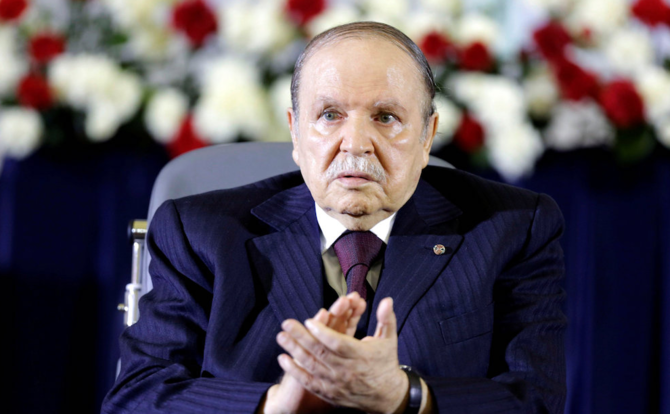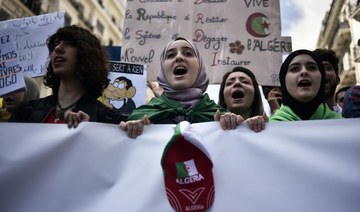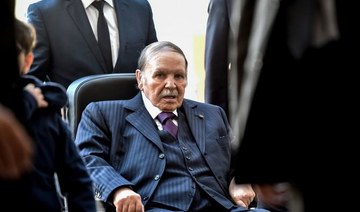ALGIERS: Algeria’s ailing leader Abdelaziz Bouteflika submitted his resignation with immediate effect, state television said Tuesday, ceding power in the face of massive street protests after two decades at the helm.
Bouteflika “officially advised the Constitutional Council of the end of his term of office as President of the Republic” from Tuesday, said a news ticker on the public broadcaster.
Long accused of clinging to power, Bouteflika has come under mounting pressure to step down since his decision to seek a fifth term despite rarely being seen in public after suffering a stroke in 2013.
The 82-year-old, who uses a wheelchair, said last month he would pull out of the bid for another term, and on Monday his office said he would resign before his mandate expires at the end of the month.
The moves failed to satisfy protesters who feared a ploy to extend his rule and the armed forces chief called for him to leave power.
His resignation was also reported by the official APS news agency, which said Bouteflika had “formally notified the head of the Constitutional Council of his decision to end his term of office.”
His departure comes after 20 years of rule, with the veteran of the independence struggle finally losing his grip after weeks of massive street protests and the loss of support from key loyalists.
Car horns sounded in the street as small crowds of people began gathering to celebrate in Algiers.
The United States said the future of Algeria was now up to its people.
“Questions about how to navigate this transition in Algeria, that is for the Algerian people to decide,” State Department spokesman Robert Palladino told reporters.
Algeria’s constitution says that once the president officially resigns the speaker of the upper house of parliament would act as interim leader for up to 90 days during which a presidential election must be organized.
The resignation came shortly after the military demanded impeachment proceedings be launched against Bouteflika immediately as it dismissed the announcement he would resign before his mandate expires.
Armed forces chief Ahmed Gaid Salah called for “the immediate application of the constitutional procedure for removing the head of state from power,” in a defense ministry statement after a meeting of top brass.
The statement said the army considered an announcement from the presidency on Monday that Bouteflika would resign by the end of his term on April 28 as invalid because it did not come from the president himself.
“Any decision taken outside the constitutional framework is considered null and void,” the general said.
Without naming anyone, Gaid Salah criticized “the stubbornness, the procrastination and the deviousness of certain individuals who are trying to make the crisis last and make it more complex with the only concern being their narrow personal interests.”
He said the army’s “sole ambition” was to “protect the people from a handful of (other) people who have unduly taken over the wealth of the Algerian people.”
A long-time Bouteflika ally, the general last week called on the president to resign or be declared unfit to rule, becoming one of the first of his faithful supporters to abandon him.
On Monday, the presidency said in a statement that Bouteflika would resign “before April 28, 2019,” after “important decisions” were taken, without specifying when these moves would occur.
The veteran leader would take “steps to ensure state institutions continue to function during the transition period,” it said in the brief statement that was carried by the official APS news agency.
That announcement was greeted by little sign of euphoria as people insisted that the whole ruling establishment must go.
Bouteflika’s resignation would not “change anything,” psychology student Meriem Medjdoub said as she marched in central Algiers earlier Tuesday with around 1,000 protesters.
“We are demanding a radical change,” she told AFP.
As rumors swirled of frantic behind-the-scenes manoeuvring, prosecutors on Monday announced they had banned corruption suspects from leaving Algeria after launching graft probes against unnamed individuals.
The authorities did not say who was being targeted by probes into corruption and illegal money transfers abroad, but they followed the arrest of the president’s key backer, businessman tycoon Ali Haddad.
Haddad, who Forbes magazine describes as one of Algeria’s wealthiest entrepreneurs, was detained at the weekend at a border post with neighboring Tunisia.
Bouteflika had named a new government on Sunday, made up mainly of technocrats under recently appointed premier Noureddine Bedoui.
The administration — supposed to steer the country toward transition — included General Gaid Salah remaining in his position as deputy defense minister.
Among the other key Bouteflika backers is his younger brother and special adviser Said, who was frequently cited in the past as a likely successor to the president.
Discreet and rarely seen in public, Said Bouteflika has exerted increasing influence behind the scenes as his brother’s health woes worsened, but the president’s resignation could take away much of his power.
Abdelaziz Bouteflika resigns as president of Algeria after 20 years in power
Abdelaziz Bouteflika resigns as president of Algeria after 20 years in power

- Announcement followed army demand for impeachment proceedings against Bouteflika
- Car horns sounded in the street as small crowds of people began gathering to celebrate in Algiers
Reactions to the crash of the Iranian president’s helicopter

- Iraqi government said it instructed relevant bodies to offer help to neighboring Iran in the search mission
LONDON: Following are reactions from foreign governments and officials to the news that a helicopter carrying Iranian President Ebrahim Raisi and his foreign minister crashed as it flew over mountain terrain in heavy fog on Sunday.
US STATE DEPARTMENT
“We are closely following reports of a possible hard landing of a helicopter in Iran carrying the Iranian president and foreign minister,” a State Department spokesperson said in a statement.
US PRESIDENT JOE BIDEN
A spokesperson for President Biden, Karine Jean-Pierre, told reporters aboard Air Force One that the president had been briefed on the situation. She did not elaborate.
AZERI PRESIDENT ILHAM ALIYEV (Raisi was returning from Iran’s border with Azerbaijan when his helicopter crashed).
“Today, after bidding a friendly farewell to the (visiting) President of the Islamic Republic of Iran, Ebrahim Raisi, we were profoundly troubled by the news of a helicopter carrying the top delegation crash-landing in Iran.”
“Our prayers to Allah Almighty are with President Ebrahim Raisi and the accompanying delegation. As a neighbor, friend, and brotherly country, the Republic of Azerbaijan stands ready to offer any assistance needed.”
IRAQI GOVERNMENT
The Iraqi government said in a statement it had instructed its interior ministry, the Red Crescent and other relevant bodies to offer help to neighboring Iran in the search mission.
UAE food aid shipment arrives in Gaza

- Shipment arrived via the maritime corridor from Larnaca in Cyprus
DUBAI: A UAE aid shipment carrying 252 tons of food arrived in Gaza bound for the north of the enclave, Emirates News Agency reported on Sunday.
The shipment arrived via the maritime corridor from Larnaca in Cyprus. The delivery involved cooperation from the US, Cyprus, UK, EU and UN.
The supplies were unloaded at UN warehouses in Deir Al-Balah and are awaiting distribution to Palestinians in need.
Emirati Minister of State for International Cooperation Reem Al-Hashimy said that the food supplies will be delivered and distributed in collaboration with international partners and humanitarian organizations, as part of the UAE’s efforts to provide relief and address the humanitarian crisis in the Gaza Strip.
The UAE, in accordance with its historical commitment to the Palestinian people and under the guidance of its leadership, continues to provide urgent humanitarian aid and supplies to Gaza, she added.
Since the war began in October, the UAE has delivered more than 32,000 tons of urgent humanitarian supplies, including food, relief and medical supplies, via 260 flights, 49 airdrops and 1,243 trucks.
The UAE delivery came as Israel closed the Rafah border crossing. The World Health Organization said on Friday that it has received no medical supplies in the Gaza Strip for 10 days.
Helicopter carrying Iran's President Raisi makes rough landing, Iranian media say

- IRNA said the helicopter in question had been carrying Raisi, Foreign Minister Hossein Amirabdollahian and local officials
DUBAI: A helicopter carrying Iranian President Ebrahim Raisi and his foreign minister made a rough landing on Sunday as it was crossing a mountainous area in heavy fog on the way back from a visit to Azerbaijan, Iranian news agencies said.
The bad weather was complicating rescue efforts, the state news agency IRNA reported. The semi-official Fars news agency urged Iranians to pray for Raisi and state TV carried prayers for his safety.
IRNA said the helicopter in question had been carrying Raisi, Foreign Minister Hossein Amirabdollahian and local officials.
Interior Minister Ahmed Vahidi told state TV only that one of the helicopters in a group of three had come down hard, and that authorities were awaiting further details.
Raisi, 63, was elected president at the second attempt in 2021, and since taking office has ordered a tightening of morality laws, overseen a bloody crackdown on anti-government protests and pushed hard in nuclear talks with world powers.
In Iran’s dual political system, split between the clerical establishment and the government, it is the supreme leader rather than the president who has the final say on all major policies.
But many see Raisi as a strong contender to succeed his mentor, Supreme Leader Ayatollah Ali Khamenei, who has strongly endorsed Raisi's main policies.
Israel war cabinet minister says to quit unless Gaza plan approved

- Israeli PM Benjamin Netanyahu dismisses comments as "washed-up words"
- Broad splits emerge in Israeli war cabinet as Hamas regroups in northern Gaza
JERUSALEM: Israeli war cabinet minister Benny Gantz said Saturday he would resign from the body unless Prime Minister Benjamin Netanyahu approved a post-war plan for the Gaza Strip.
“The war cabinet must formulate and approve by June 8 an action plan that will lead to the realization of six strategic goals of national importance.. (or) we will be forced to resign from the government,” Gantz said, referring to his party, in a televised address directed at Netanyahu.
Gantz said the six goals included toppling Hamas, ensuring Israeli security control over the Palestinian territory and returning Israeli hostages.
“Along with maintaining Israeli security control, establish an American, European, Arab and Palestinian administration that will manage civilian affairs in the Gaza Strip and lay the foundation for a future alternative that is not Hamas or (Mahmud) Abbas,” he said, referring to the president of the Palestinian Authority.
He also urged the normalization of ties with Saudi Arabia “as part of an overall move that will create an alliance with the free world and the Arab world against Iran and its affiliates.”
Netanyahu responded to Gantz’s threat on Saturday by slamming the minister’s demands as “washed-up words whose meaning is clear: the end of the war and a defeat for Israel, the abandoning of most of the hostages, leaving Hamas intact and the establishment of a Palestinian state.”
The Israeli army has been battling Hamas militants across the Gaza Strip for more than seven months.
But broad splits have emerged in the Israeli war cabinet in recent days after Hamas fighters regrouped in northern Gaza, an area where Israel previously said the group had been neutralized.
Netanyahu came under personal attack from Defense Minister Yoav Gallant on Wednesday for failing to rule out an Israeli government in Gaza after the war.
The Gaza war broke out after Hamas’s attack on October 7 on southern Israel which resulted in the deaths of more than 1,170 people, mostly civilians, according to an AFP tally of Israeli official figures.
The militants also seized about 250 hostages, 124 of whom Israel estimates remain in Gaza, including 37 the military says are dead.
Israel’s military retaliation against Hamas has killed at least 35,386 people, mostly civilians, according to the Hamas-run Gaza’s health ministry, and an Israeli siege has brought dire food shortages and the threat of famine.
US, Iranian officials met in Oman after Israel escalation

- Washington called on Tehran to rein in proxy forces
- Officials sat in separate rooms with Omani intermediaries passing messages
LONDON: US and Iranian officials held talks in Oman last week aimed at reducing regional tensions, the New York Times reported.
Through intermediaries from Oman, Washington’s top Middle East official Brett McGurk and the deputy special envoy for Iran, Abram Paley, spoke with Iranian counterparts.
It was the first contact between the two countries in the wake of Iran’s retaliatory missile and drone attack on Israel in April.
The US officials, who communicated with their Iranian counterparts in a separate room — with Omani officials passing on messages — requested that Tehran rein in its proxy forces across the region.
The US has had no diplomatic contact with Iran since 1979, and communicates with the country using intermediaries and back channels.
Since the outbreak of the Gaza war last October, Iran-backed militias — including Hezbollah in Lebanon, the Houthis in Yemen, and armed groups in Syria and Iraq — have ramped up attacks on Israeli and American targets.
But US officials have determined that neither Hezbollah nor Iran want an escalation and wider war.
After Israel struck Iran’s consulate in Damascus at the beginning of April, Tehran retaliated with hundreds of ballistic missiles and drones.
The attack — which was intercepted by air defense systems from Israel, the US and the UK, among others — was the first ever direct Iranian strike on Israel, which has for years targeted Iranian assets in Syria, whose government is a close ally of Tehran.
National Security Adviser Jake Sullivan said in a news conference this week that the “Iranian threat” to Israel and US interests “is clear.”
He added: “We are working with Israel and other partners to protect against these threats and to prevent escalation into an all-out regional war through a calibrated combination of diplomacy, deterrence, force posture adjustments and use of force when necessary to protect our people and to defend our interests and our allies.”


















